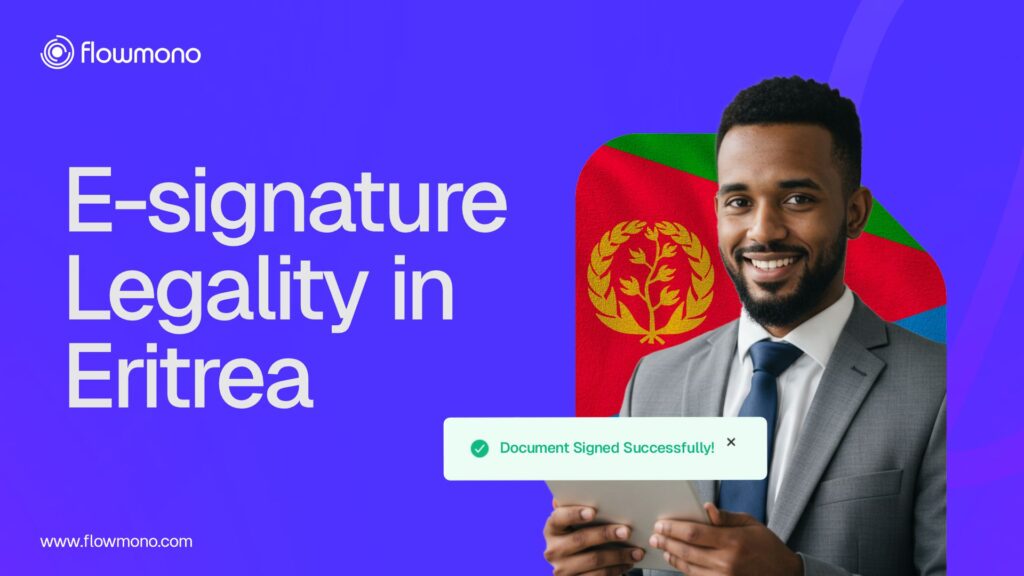
The legal status of electronic signatures in Eritrea is complex, as the country’s legislative and digital infrastructure development has been slow compared to other nations. Eritrea does not have a comprehensive, publicly available legal framework that explicitly addresses the validity and use of electronic signatures, electronic contracts, or e-commerce in a detailed manner. While there are some initiatives to digitize government records, a dedicated legal code for electronic transactions has yet to be enacted.
Overview of the Legal and Regulatory Environment
Eritrea’s legal system is primarily based on civil law, with a strong emphasis on traditional legal practices. The country has not yet acceded to or adopted key international model laws that govern electronic transactions, such as the UNCITRAL Model Law on Electronic Commerce. This creates legal uncertainty for both domestic and international businesses that wish to engage in digital transactions with Eritrean entities. The absence of a clear legal framework means that the legal validity of an electronic signature would likely be determined on a case-by-case basis, relying on general principles of contract law and evidence.
1. Absence of Specific Law: There is no specific law or proclamation in Eritrea that grants legal recognition to electronic signatures and documents.
2. Challenges: The lack of a clear legal framework, combined with a restrictive business environment and limited internet penetration, are significant barriers to the development of a digital economy. This is a common challenge for many countries in the Sub-Saharan African region, as noted in various reports.
Documents That Can (and Cannot) Be Signed Electronically
Given the absence of a specific legal framework, there are no definitive rules on what can or cannot be signed electronically. However, based on general legal principles and practices in similar jurisdictions, it’s reasonable to infer the following:
1. Documents Likely to Be Enforceable: For low-value or informal agreements, electronic communications (e.g., email exchanges) might be accepted as evidence of a contract. These could include general commercial agreements, non-disclosure agreements, or simple service contracts, where the intent of the parties is clear and can be proven.
2. Documents That Would Likely Require a Wet-Ink Signature: In the absence of specific legislation, documents that typically require a high degree of legal formality or a public official’s certification would almost certainly not be legally binding with only an electronic signature. This includes:
- A. Real estate deeds and property transfers: These transactions require notarization and physical registration.
- B. Wills and other testamentary documents: These require a high degree of formality, including witness signatures, to prevent fraud.
- C. Family law documents: This includes marriage and divorce certificates.
- D. Contracts with government bodies: Many government processes and official documents require physical signatures and seals for authenticity.
Notable Changes in the Laws
There have been no significant, publicly reported changes to Eritrea’s laws regarding electronic signatures. The country’s legal and regulatory environment remains largely unchanged in this regard. While there has been an effort to digitize some government records, such as the Gazette of Eritrean Laws, this is primarily a move toward greater accessibility of existing laws rather than the creation of a new legal framework for digital transactions. Any future changes would likely be part of a broader government strategy to modernize the economy and improve service delivery, but such a plan has not been formally announced or implemented.
Disclaimer
The information on this site is for general information purposes only and is not intended to serve as legal advice. Laws governing the subject matter may change quickly, so Flowmono cannot guarantee that all the information on this site is current or correct. Should you have specific legal questions about any of the information on this site, you should consult with a legal practitioner in your area.
References
- Eritrea’s Government: Official legal gazettes and government websites would be the primary source for any new legislation, but as of now, there is no publicly accessible law on e-signatures.
- IMF eLibrary, Digital Payment Innovations in Sub-Saharan Africa (2025).
- Library of Congress, “Digital Collection of the Gazette of Eritrean Laws Goes Live,” In Custodia Legis, (September 4, 2020).
![]()
